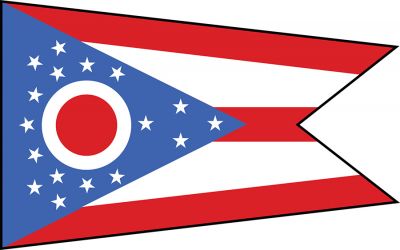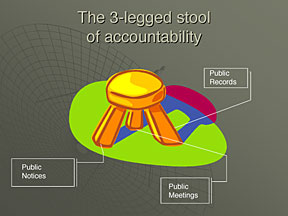Ohio enacts law curtailing newspaper notice
Public Notice Resource Center & NNA
Nov 1, 2023

Last month, we reported that through the end of the summer there were no states that had approved legislation significantly altering their public notice laws (https://bit.ly/3s6f6ez). Sadly, we were wrong.
Unbeknownst to most in the newspaper business, two months earlier, Ohio Gov. Mike DeWine had signed into law measures buried within the legislature’s 6,198-page budget bill (https://bit.ly/3QcSwJ1) that will bring sweeping changes to the state’s public notice regime. DeWine signed the bill less than a week after it passed both the GOP-dominated state House and Senate by wide margins on June 30.
Most importantly, Ohio HB-33 allows municipalities to publish many or most of their notices on their own websites and social media feeds, or on the Ohio News Media Association’s (ONMA) statewide public notice website, instead of publishing them in local newspapers or legal journals. The bill also reduces the number of newspaper ads required to be published by some municipalities and state agencies in connection with specific types of notices; allows Ohio’s state environmental agency to publish all of its notices on its website instead of local newspapers and legal journals; and raises the spending threshold above which many or most government agencies are required to publish newspaper notices soliciting bids. The law is in effect.
[Read PNRC’s analysis of Ohio HB-33 at https://bit.ly/3tW7xHD)
There are still many provisions in Ohio’s legal code requiring cities and villages in the state to publish specific types of notices in a local newspaper. It isn’t clear whether HB-33 was designed to override those provisions, even though they weren’t amended by the legislature. ONMA has declined to provide PNRC or its members with guidance on the issue.
Perhaps most bizarrely, HB-33 extends the state’s prohibition against newspapers charging a fee for publishing notices on ONMA’s statewide public notice website. (Ohio was one of the first states to pass a law requiring newspapers to publish their paid print notices free of charge on a state press association website. That law remains on the books. https://bit.ly/3s8gUUb) The proscription against compensation now includes situations in which “the notice or advertisement is not otherwise published in a newspaper or journal.” Taken in tandem with the provision in HB-33 allowing municipalities to publish their notices on the ONMA website, it means the Ohio legislature passed a law that apparently requires the newspaper association to publish the state’s public notice ads without compensation.
The absurdity and potential illegality of forcing a press association to provide free services to the state demonstrates the extent to which the legislature was flying blind when it passed the bill. In a Sept. 18 email, ONMA President and Executive Director Monica Nieporte told her members the association “was never consulted about the functionality or capabilities of publicnoticesohio.com prior to enactment of the changes.” She also wrote the website isn’t presently capable of accepting ads directly from customers. Moreover, most of the public notice provisions jammed into the bill had never been introduced or debated by the legislature.
Sneaking controversial, non-germane provisions into a humongous spending bill at the last minute is an opaque tactic practiced by many legislatures to bypass opposition to controversial measures. Nevertheless, Nieporte submitted testimony in June objecting to the changes. However, it isn’t clear why it took the association more than two months to inform its members about the bill, or why it still hasn’t provided them with an analysis of the legislation or a plan of action moving forward.
As far as we can tell, not a single newspaper or media outlet in the state reported on the public notice implications of HB-33 until Sept. 28, almost three months after it was signed into law. This unprecedented lack of reporting on a vital government transparency issue was presumably a result of ONMA’s silence.
Ohio is now the second state to pass a law allowing local governments to post a substantial portion of their notices on their own websites. While HB-33 is clearly less comprehensive than the bill passed last year by the Florida legislature, it contains fewer guardrails and hurdles before local governments can alter time-tested systems that provide their citizens with official notice.
Column to close statewide website business
About a dozen press associations received a bit of a surprise at the end of September when one of the two major vendors of statewide public-notice websites announced it was “sunsetting” that part of its business (https://bit.ly/3s0zEFj). In the release announcing its decision, Column said it was making the change to focus on its public notice platform for publishers, which it says “has grown considerably ... over the past year.”
Column is giving its press-association clients plenty of time to migrate to a new service; they have until May 31, 2024, to find a new vendor. The company recommended that its clients transition to the other major statewide public-notice website vendor — the Illinois Press Association — which Column called “the best alternative provider of public notice website hosting.”
Several other vendors also provide software to power statewide public notice websites, including two — Tecnavia and Newz Group — that service multiple press associations. A list of such websites, organized by the vendors currently operating them, is provided below.
Column was the only vendor that provided its platform free of charge, leveraging the deals it cut with press associations — some of which included revenue-sharing arrangements — to help market its public notice platform for publishers.
Despite the fact that it offered its statewide-website platform for free, growth in that part of Column’s business had stalled. Its last new client was added 12 months ago, and both the Florida Press Association and the Pennsylvania NewsMedia Association moved to new website vendors in 2023. The company is presently servicing 13 press associations in 15 states and the District of Columbia.
Column is now also providing its public–notice platform to county governments in Florida that qualify to publish notices on their website under the state’s new public notice law. Earlier this year, the company announced it wanted to partner with local newspapers to offer such counties a “bundle solution” that would allow them to continue to provide notice in print (https://bit.ly/49p18p1). Their first two clients are Brevard County (brevardfl.column.us) and Bay County (publicnoticesbaycountyfl.gov), where Column partnered with local newspaper companies Hometown News and Neves Publishing to provide notice. Column also recently announced Tampa Bay Times had signed on to offer the bundle solution to Pinellas, Pasco and Hillsborough Counties (https://bit.ly/3QxbTOu). And the company tells us it recently inked a deal with Dunn-Rankin Media to target the counties that newspaper firm publishes in.
Column was founded as e-notice in 2019 by Jake Seaton, descendant of the family owning the Manhattan Mercury in Kansas for over a century. Seaton Publishing Co. also has ownership interests in about a dozen other newspapers in the upper Midwest and several radio stations in Manhattan, Kansas.
Column is unusual in the newspaper business for its ability to raise substantial amounts of investment. After initially attracting millions in seed capital, the company raised another $30 million last year from the venture firm Lux Capital (https://bit.ly/45N5YsX).
The software firm’s mission is “to make public information systems more valuable, beginning with public notice” (https://bit.ly/46ZGtWA). In 2020, it registered with the state of Delaware as a public benefit corporation, a type of for-profit company whose goals include making a positive impact on society (https://bit.ly/3Q8soPA).










